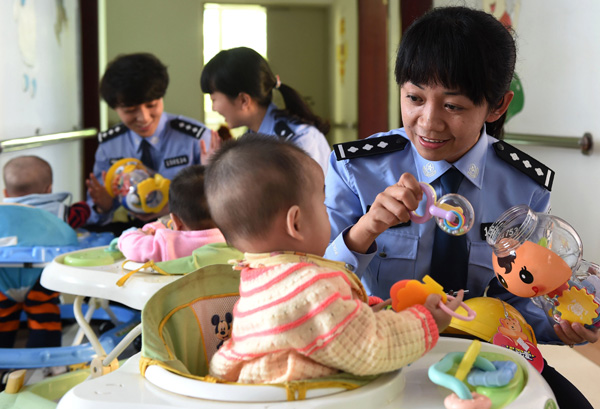 |
|
A policewoman plays with one of the 11 babies rescued from a child trafficking ring in Yunnan province in August. The search is now on to find the children's parents. Lin Yiguang / Xinhua |
Punishing purchasers
Under a proposed amendment to China's Criminal Law, which has been submitted to the National People's Congress for approval, people who buy trafficked infants will be held criminally accountable. That only happens under the present law if they actively hamper police rescue attempts, or physically abuse the children.
"When the amended Criminal Law comes into effect, it will eliminate the demand from buyers, and attack the trade in human traffic at its very roots," Wu Ming'an, a law professor at China University of Political Science and Law, said.
Li Wei, a lawyer from the Beijing Lawyers Association, said people convicted of abducting children face sentences ranging from five to 10 years. "If the circumstances are serious - such as the abduction of more than three children, causing death or serious injury, or selling children overseas - the traffickers will face sentences ranging from 10 years to death."
Chen said thousands of families have been reunited by a groundbreaking national DNA database. Ministry statistics show that since April 2009, when the database was launched, more than 1,500 youngsters have been reunited with their parents.
Chen said blood samples are taken when parents report children missing, or when the police rescue abducted children. The information is immediately entered on the national DNA database.
"The system can quickly compare DNA samples from the parents and children and can be accessed by the police nationally," he said.
Facing obstacles
According to Chen, his officers face practical difficulties when working on cases of children who have been missing for a long time.
"After many years, a child may have been trafficked many times, and their appearance, voice, or individual information may have changed completely, so it's difficult to collect valuable clues to identify them."
He said the police will attach greater importance to visiting villages in key areas, such as Yunnan, Guangxi, Guangdong, and Fujian, and will also improve collection methods for blood samples.
Dai Peng, director of the criminal investigation college at the People's Public Security University of China, said: "The priority must be to impose harsher punishments on the purchasers, and improve the legal and moral education of local residents, especially those in key trafficking areas, such as Yunnan and Guangdong."
He also suggested the public security service should deepen cooperation with the relevant government departments, including welfare institutes and the department of education, to improve social management in coping with child abduction.
Contact the writers at zhangyan@chinadaily.com.cn and wangqian@chinadaily.com.cn
|
Stepping up the search |
| As part of their efforts to end child abduction, Chinese police are using both social and traditional media platforms to broadcast information and collect clues.
"Social media and media platforms have widespread influence, and they are proving to be effective ways of locating missing children," said Chen Shiqu, director of the human trafficking task force under the Ministry of Public Security, who claimed that many missing and abducted children have already been found through these channels. Chen's fight against child abduction has earned him celebrity status in China. His micro-blog account on Sina Weibo has nearly 6.4 million followers, and more than 2 million people read his micro blog on Tencent, one of China's largest web portals. Netizens contact Chan's micro blog regularly, seeking help in locating missing children and posting snapshots of children suspected of having been trafficked. The photos provide clues for the police and bring hope to the families. In addition to social media, the police are strengthening cooperation with traditional media outlets, including People's Daily and China Central Television, to help reunite abducted children and their families. On Nov 3, the human trafficking office of the Ministry of Public Security and People's Daily launched a joint campaign called Guarding Babies to raise public awareness. It also encourages people to fight child trafficking via an information system about missing children and their families, plus a website that provides parents with tips on safeguarding their children. "The campaign will provide a safety net to help every child return home safe and sound," Ding Wei, senior editor at People's Daily, said. In September 2013, CCTV launched a program called Waiting For Me, which helps find missing people. Yu Zhenbao, 23, was abducted in Yunnan province when he was just 4 or 5, and was later sold to "foster parents" in Fujian province. He managed to contact his biological parents through Waiting For Me, saying he wanted to let them know he was alive so they would stop worrying about him. Although the parents of the 11 trafficked infants rescued by railway police in Kunming have yet to be found, Liang Yong, a police officer in Yunnan, was hopeful they will soon be reunited with their families. |
